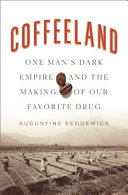2018 School Spending Survey Report
Coffeeland: One Man’s Dark Empire and the Making of Our Favorite Drug
COPY ISBN
VERDICT Sedgewick’s wide-ranging work is most appropriate for readers with a serious interest in food economics.
RELATED
ALREADY A SUBSCRIBER? LOG IN
We are currently offering this content for free. Sign up now to activate your personal profile, where you can save articles for future viewing




Comment Policy:
Comment should not be empty !!!